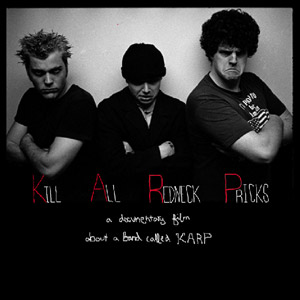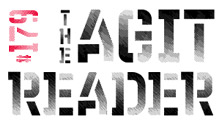
A Documentary Film About a Band Called Karp
Molasses Manifesto
If Anvil! The Story of Anvil has taught us anything, it’s that if a documentary is done well enough, any band’s story can be made to seem compelling. But as anyone acquainted with hard-hitting mid-90s trio Karp will tell you, no movie is needed to make their music any more memorable. Though they rarely left the West Coast and released only three albums before calling it quits, there were few bands that could match their visceral charge. People still talk about the band with a revered tone usually reserved for legends of the ’60s and ’70s, both in conjecturing on what might have been and in reverence of what the band left in its wake.
Still, it comes as something of a surprise that more than a decade later Karp has become the subject of a documentary. Surprising that there’s footage of the band beyond low quality Youtube clips and surprising that there’s still the kind of interest to warrant such a flick. As it is, Kill All Redneck Pricks: A Documentary Film About a Band Called Karp is a welcome addition to the realm of music docs. Directed, shot and edited by William Badgley, the film traces the history of the band from when its three members—drummer Scott Jernigan, bassist Jared Warren and guitarist Chris Smith—were just geeks at Tumwater High School in suburban Washington. Smith had been printing a zine called Kill All Redneck Pricks (KARP), and inspired by Northwest heroes the Melvins, the trio started a band that took the publication’s name. They were quick learns, and by the time the chums were high school seniors, they were touring in California selling handmade cassettes.
Unfortunately, Karp’s story is not a happy one. With each of the three records they released on the locally based K Records, both their prowess and popularity increased exponentially, and by the time of their 1997 Self-Titled album, there was the sense that the band was on the precipice of even greater success commercially and artistically. However, Smith’s drug use and suicide attempt derailed the band and they broke up in 1998. While the guitarist continued to struggle with heroin, Warren played with the Tight Bros from Way Back When for the next few years. In 2002, Warren and Jernigan reunited to form The Whip, but before the project really got off the ground, Jernigan was killed in a boating accident. Jared eventually ended up playing in Big Business and, funnily enough, the Melvins, while Chris finally got clean.
Relying heavily on interviews with friends and associates like Calvin Johnson, KARP isn’t the most riveting of films, though the live footage is magnetic for no other reason than Karp’s pure brute sonic force. And it’s odd that Jared’s time in the Tight Bros is skipped over, despite his bandmates in that band being interviewed extensively throughout the film. But it’s an interesting story nonetheless as it not only shows Olympia’s music scene at its apex, but reveals a band that was built as much on friendship as it was on music. Though Jared never gets emotional, at the movie’s close he admits, “It leaves a really lonely spot in my heart... It’s hard for me to explain to people what it’s like to lose your two best friends... I miss both of them all the time.” As such, KARP isn’t a grand tragedy, though it is tragic. Nor is it an archetypal tale of grand themes. Instead, it is a personal story of three friends who formed a band that at one point was arguably one of the best we’ve ever heard.
Stephen Slaybaugh
Kathryn Calder and Mark Eitzel Live Review
The Ballad of Mott the Hoople
I Want My MTV: The Uncensored Story of the Music Video Revolution
Lindsey Buckingham Live Review
Scratch Acid Live Review
Def Jam Recordings: The First 25 Years of the Last Great Record Label
Beats, Rhymes & Life: The Travels of A Tribe Called Quest
Put the Needle on the Record
The Karaoke Singer's Guide to Self-Defense
Are We Still Rolling?
Orchestral Manoeuvres in the Dark Live Review
The Raincoats Live Review
!!! Live Review
1991: The Year Punk Broke
